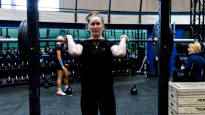Three-shift work combined with a career as a hockey player. The equation sounds impossible.
The Rosa Lindstedt tried anyway. Lindstedt worked a full week as a nurse in a nursing home and played ice hockey in Tampere’s Ilves.
– It started to run low on own resources. Running the everyday was quite a rollercoaster. It wasn’t a working equation to do a full work week and imagine being an athlete at the same time, Lindstedt recalls more than ten years ago.
In women’s ice hockey, there was not – and still is not – a professional career path. In Finland, women still have to pay to play in many hockey clubs, even if they have reached the major league level.
Still, Lindstedt decided to invest everything possible in hockey.
– Do I want life to pass me by, that I just go on a squirrel bike? Or do I want to do the things that make me happy and that I really enjoy, he thought.
In 2012, Lindstedt moved to Jyväskylä, his good friend Jenni Hiirikoski attracted.
– Then I thought that if I really want to invest in sports, now I have a good seam. It was a turning point in my own career. I got good coaching and a good company, Lindstedt says about his transfer to JYP.
Paid work could not be completely abandoned, as a living had to be obtained from outside the rinks.
– I had to carefully calculate what is the minimum amount of money I can get by with. How can I pay the rent and bills? How much money do I need for food?
From love to sport.
Rosa Lindstedt
Lindstedt found a good employer with whom work shifts could be arranged with training and playing.
– I started working half a week. That’s when I noticed that when there was time left for training and recovery, it was better, says Lindstedt.
However, the decision to invest in hockey was not easy.
– It requires courage. Because if you’re a pretty woman in your twenties, then you start to wonder if there’s going to be a family soon. It’s not appropriate to put your whole life only into sports!
There were enough doubters and puzzlers. Lindstedt still remembers the defining moment at the Hippos ice rink.
– A player from the men’s team came to ask us why you play when you don’t get paid for it. We were absolutely blown away.
Lindstedt’s and his teammates’ answer came immediately, despite the bewilderment.
– Why do you play?
That was the end of the conversation.
Lindstedt knew exactly why he played hockey. And still playing.
– Playing the game itself is so much fun that you want to do it. And aim for a place in the national team. It’s nice to go to the gym, challenge yourself in training and games. There is such a strong attraction to doing it. From love to sport.
“I have the opportunity to be a professional”
While playing in Jyväskylä, Lindstedt sometimes had to borrow money from his father if unexpected expenses came up, such as going to the dentist.
He spent a total of four years at JYP. In the end, the penny-pinching was rewarded. Lindstedt got to play in Sweden.
– Now I have spent several years here in Sweden and I feel that I am a professional today.
Seasons 2016–2020 Lindstedt played for HV71. Now he is wearing a Brynäs IF shirt, with the captain’s letter C on the chest.
The definition of professionalism is simple for Lindstedt.
– At the moment, I can only focus on training and playing. And I get compensation from the club for the work done.
In addition, Lindstedt, 34, coaches Brynäs’ girls team for a few hours a week.
– And in addition to that (club team), a big enabler is the support money from the Olympic Committee. That is, when they are combined, I have the opportunity to be a professional.
Financial benefit is a secondary issue
– The biggest thing as a female hockey player is that you get to play for the national team. It’s not about money. The first thing I think about there is whether I will get some financial benefit from this, he says.
Although most of the players of the women’s national ice hockey team are amateurs, the public evaluation of the Women’s Lions is still similar to that of professional athletes.
– Now the recent news coverage has been negative, among other things, commitment has been questioned. That discussion, on the other hand, has been quite appropriate. It was essential to go through things.
The former head coach Pasi Mustonen and the goalkeeper Noora Rädyn disputes between have been discussed in public numerous times in recent months. The biggest headlines in the Women’s Lions World Cup tournament were written when the team’s star player Susanna Tapani left mid-tournament for a friend’s wedding and missed one match.
In Lindstedt’s opinion, public pressure and criticism are part of the issue when playing in the Olympics or World Championships, whether it’s a professional or amateur sport.
– If you want to be in the group where it is measured who is the best in the world, then the level of requirements is tough, and the criteria are also tough. Then you expose yourself to such a situation that you can be criticized and your actions evaluated.
Lindstedt has experienced the everyday life of a female hockey player as an amateur and a professional.
– And I haven’t regretted a single day.
Rosa Lindstedt and Marko Malvela discussed the relationship between amateur and professional sports in the Urheiluhullut program hosted by Jussi Paas. Listen to the conversation from Areena.
